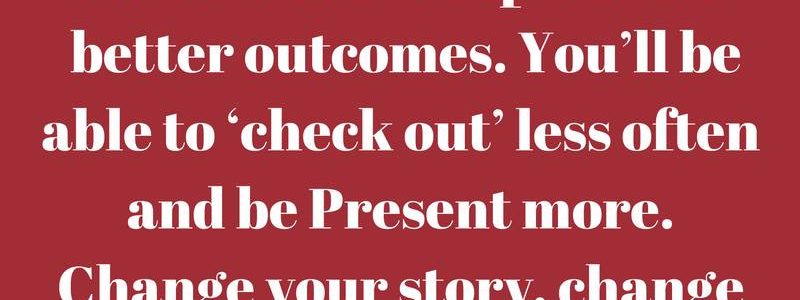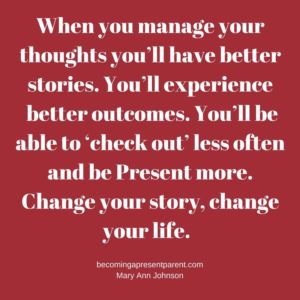 Recently, I had an experience that revealed an old dream of mine that had come to pass.
Recently, I had an experience that revealed an old dream of mine that had come to pass.
I had just come through a time when I felt like a failure in several areas. As a result, I contemplated my life, how I was living it, and wondered about my impact on the world.
I knew that caring for my mom and husband mattered. I knew that helping my daughter with Maggie, my special needs granddaughter mattered. I knew that my weekly writing mattered because I got mail.
However, it’s easy to fall into a funk and doubt yourself. It happens. The key is to get out as quickly as you can. I went to God in prayer and talked to him about it. He knows me best, after all.
Not long after that prayer, I was caring for my mom. I had bathed her and helped her pick out clothes to wear. I was clipping her toenails and fingernails. Into my mind came a picture of my seventh-grade self. I was at a nursing school on a field trip. I was learning how to make hospital corners on a bed. I was in this place with other girls my age because I wanted to be a nurse, and we were part of a nursing club. That’s how much I wanted to be a nurse.
When I went to college, I thought it would be better if I became a Special Education teacher like my dad, so I let the idea of nursing go. I quit school one semester before graduation because I had my first baby. When Jodie was three and a second baby had been born, I went to work and helped my husband graduate. Then, life happened; five more kids, a couple of moves, no more school, no teaching degree, no nursing degree.
When my seventh-grade self came into my mind, I clearly saw that my desire to become a nurse was here, in my life, at age seventy-two. I was caring for three people. I managed meds and feeding tubes. I changed diapers on an almost adult and dressed, fed, and bathed those who could not do it independently. In addition, I handled doctor’s appointments and therapies.
This realization was so shocking that I went back to God and asked Him to show me what other dreams I had accomplished in my life but hadn’t acknowledged.
Seven more dreams came clearly into my thoughts.
– Have a large and successful family
– Be a Special Education teacher
– Speak from stage, teach, and mentor
– Become a writer and publish a book
– Live with my husband for 50 years, sleep in the same bed, and be deeply in love
– Have the trip of a lifetime with Don
– Live a Tasha Tudor life
Five of these dreams were formed before I was fifteen years old. The rest were clearly in my mind by the time I was thirty. Back then, I thought of them as dreams, but now, years later, I know that they were goals because I never completely let go of them. I didn’t have them on a vision board or written down. I hadn’t attended any classes on controlling your thoughts or visualizing. All I knew was these things mattered to me. How to manifest what you want in life would come to me later, in my sixties, but by then, because I held on to these dreams, they had almost all come to pass, and by the time I was seventy, they had all come to pass.
Some of these dreams seemed impossible. Others began to feel as if I shouldn’t want them so much. I mean, I had a family and a life without them. But I couldn’t shake them.
As briefly as I can, let me share each goal and its fulfillment. This will be important later.
1. Have a large and successful family – When I was a girl, I decided that I would have a big family. I wanted my kids to be successful in life. We had seven children, and then we entered 13 troubled years. Some of our kids used drugs, one had a child out of wedlock, one was gay, and there were other issues. I felt like a failure. Don felt like a failure.
However, I realized a few years ago that we accomplished this goal. We have seven very whole adults. Of course, no one is free from baggage, but they are kind, loyal, integrous, honest, hardworking, love nature, are loyal friends. They are good, good people.
2. Be a Special Education teacher – When I went to college, I decided to become a special education teacher. However, I quit school one semester before graduation when I had my first baby and then put my husband through school. I thought I would go back and catch that final semester, but we moved, and it didn’t happen. This was before the days of online schooling.
After my seventh child was born, in my forties, I returned to college. However, because special education had advanced so much in the ensuing years, I realized I would have to redo too much. I opted for an education degree instead.
Guess what happened. In my fifties, I had a granddaughter born with severe cerebral palsy. I often need to care for her, so I learned to manage her meds and feeding tube. I dress her, brush her teeth and hair, and feed her. But I have done more than care for her physical needs. I helped her write in a journal for over ten years by becoming well versed in how to question her and get answers even though she couldn’t speak. I helped her learn the alphabet. I held her hand and helped her write because she couldn’t hold a pencil independently. We have filled many journals. I have conversations with her. I have helped her with schoolwork. I was her full-time aide in school one year. I occasionally was her online aid during Covid.
I may not have a degree in special education, but I have had the privilege of living and working in that field. I have accomplished this goal.
3. Speak from stage, teach, and mentor – I wanted to speak from stage as early as five years old. I LOVED it! I was NEVER afraid to get in front of an audience and took every opportunity that came my way – church, debate, speaking competitions in junior high and high school, singing a solo in front of my seventh-grade class. Later the desire to teach and mentor became strong. Then as mentioned, life and family happened. But that led to some fantastic opportunities to work on this goal.
I taught myself to decorate cakes beginning in ninth grade. I learned how to make gingerbread houses and then villages in that process. Next, I began teaching my children’s school classes how to build a gingerbread house out of graham crackers and milk cartons. I did this every year for over twenty years. Then I began teaching some community education classes on cake decorating and gingerbread creations. Eventually, I stood in front of high school classes and adults teaching this craft in many small towns and cities.
I had four daughters and became a Girl Scout leader in Billings, MT. I also chaired multiple day and overnight camps, coordinating week-long camps for over 100 girls at a time. In addition, I trained over fifty leaders on how to teach and work with children during my tenure.
Can you believe that I was still wondering how I was going to speak, teach, and mentor others at this point in my life? Then I moved to Utah and became involved in the homeschool community. Because I had homeschooled two of my seven children, I began to teach and mentor. I created and led many in-person events. I pursued this love for over twelve years. I traveled all over the United States, teaching what I had learned in thirty-nine years of parenting seven children in my home.
I hadn’t thought about it, but I accomplished this lifelong goal as I lived my life and raised my family.
4. Become a writer and publish a book – When I was about 7, my Grandma Gardner gave me a blank book to write in. At about this same time, I discovered a whole row of Oz books in the Afton, WY. library. I read ALL the OZ books. Did you know there are 14 of them? I knew then that I was a writer. I knew I would write a book someday.
But the truth is, as life happened, I worried that I wouldn’t write a book. I was busy parenting, and what did I have to say that anyone would be interested in? Well, it seems there was a lot, in fact, parenting and connecting with kids! In 2010 I started a blog. By 2016 I had written well over 500 articles. These articles and some of my research became the basis for my book, Becoming a Present Parent: Connecting with your children in five minutes or less, published by Cedar Fort Publishing in 2017. Imagine that!
I have become an accomplished writer. I am a writer in the best sense of the word because I impact others for good.
5. Live with my husband for 50 years, share the same bed, and be deeply in love – When I married Don, I decided that we were going to be married at least 50 years and that we would share the same bed, no matter what and that our love would be real and boundless.
I came to this decision as I watched two sets of grandparents. First, my Cazier grandparents celebrated their 50th wedding while I was a young mother. Then grandma got Alzheimer’s, and grandpa cared for her until she died, even though she didn’t always know who he was. He LOVED my grandma!
Don’s Landis grandparents didn’t sleep together or share the same room. There were health issues and other things. I determined that I would always share Don’s bed, no matter what! We are now in our 51st year, and we are still in the same bed. I have had to make concessions so that could happen because of his health, but inside there was this unspoken goal, and it made the choices manageable.
In our marriage, when life got hard, I would have the word divorce come into my mind, and I am sure it came to Don’s. But this quiet, heart-felt goal helped us hold on, and in the end, it all came out right, despite the trouble we weathered as a family. I knew that Don and I had reached a unique level of love for one another when we took our lifetime trip.
6. Have the trip of a lifetime with Don – We had never gone anywhere far from home in all the years we had been together. Unfortunately, our honeymoon wasn’t very successful. LOL I thought about where we could go to have a fabulous trip. Don’s health made travel and walking difficult. I settled on Hawaii not because I had wanted to go there my whole life. In fact, I had other places I really wanted to go, like Maine. : ) But Hawaii seemed like a place you would go for the trip of a lifetime. It was exotic but still in America with good health facilities.
I held onto that goal for over ten years while Don’s health declined, the medical expenses grew, and retirement loomed. Then last year, I got a call from my sister, who was heading to Hawaii with her husband. She invited Don and me to come. Everything would be paid for except our airline tickets, food, and souvenirs. I couldn’t believe it. But in the end, I knew we couldn’t make this lifetime trip. When we saw my sister’s videos, we knew we had made the right call.
I thought that goal was over. But for our fiftieth wedding anniversary, our children bought us a night in a fabulous cabin in Springdale, Utah, where many of them had lived and worked. Don and I scheduled two more nights in a small house in Hurricane, Utah, just down the road from Springdale. Hmmm, not very far from home.
I want you to know that this was the TRIP OF A LIFETIME! I got everything I had ever wanted. We might as well have been on the honeymoon we wished we had had. We had so much fun. We were alone for the first time in decades. We sat in the garden and swung, listened to music and a book on tape. We ate out and met people who knew and loved our kids.
We talked a lot, kissed, hugged, and sat in the sun. We learned things about each other that we hadn’t discovered in fifty years together. Our sense of love, concern, and caring for each other was palpable. I realized it wasn’t the place that mattered, it was the content, and it was PERFECT.
Last week, I read an article by Marni Pherson Kuhns on the Leslie Householder Rare Faith site. I know both women. I have spoken on the same stages they have. I have sat in classes with them and in classes taught by them. They have mentored me. Leslie’s book writing class got me thinking again about that old goal of publishing a book.
Here is how Marni began her article:
“Have you ever written down a goal, forgotten it, and then found that piece of paper later and discovered that you accomplished the goal you wrote down? If so, you have reaped the rewards of living in harmony with the Law of Perpetual Transmutation. The Law of Perpetual Transmutation states that everything is either moving in or out of form.”
Marni’s words mirror the message I am sharing with you today, and I hope you are listening! I have experienced this law in my own life. I didn’t write these goals down for the most part because I was a child when they were born. But I occasionally brought them out of my heart and looked at them, and I wanted them. And they came to pass. Not always in the way I anticipated, but the results were exactly what I wanted.
I am sure that you get lost in life just like I do. I am sure that parenting takes a great deal of your mental bandwidth. You probably have dream goals that you love and want, that you have hidden in your heart because there doesn’t’ seem to be a way to get them.
I am here to tell you that you can have them. If your dreams matter to you, if you talk to God about them, if you pull them out of your heart into the sunlight now and then, they will grow. We don’t have to abandon our role as mothers or homemakers to realize the dream goals in our hearts.
My family is whole, healthy, and successful despite some severe challenges. I never went to nursing school, but I am a nurse. I don’t have a special education degree, but I have opportunities to work in special education every day, right in my home.
I found a way to teach and speak right where I was, helping with things that helped my kids, in my hometown. And then later, I flew all over the country speaking from stage and teaching. I was patient and served where I was, and it led to something bigger.
I never took any writing classes in college, but I am a writer. I write an article every week, and I get mail! In addition, I have a published book. This came to fruition in my sixties and seventies.
We had trauma in our family. We sometimes wondered if we could weather the storm. Life was sometimes very hard. BUT we made it despite all that and the ill health that followed. We have been together almost 51 years, and we are deeply in love.
At seventy-one, I had the trip of a lifetime. It was a miracle and a gift.
If you hold on to your dream goals and have faith in yourself and them, they will come to pass. You may be older or not. They may not look as you envisioned them but get them, you will. You will experience what Leslie and Marni call the Law of Perpetual Transmutation.
So, take heart, busy mama. Love your family. Be present with them. Look for opportunities right where you are, and then be patient. Hold on to your dream goals. Love them.
All things come to those who wait with faith and courage.
P.S. You will notice I didn’t talk about my desire to live a Tasha Tudor life. That is for next week. You won’t want to miss it.


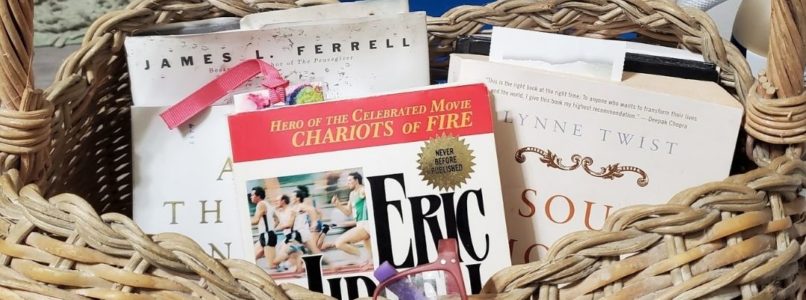
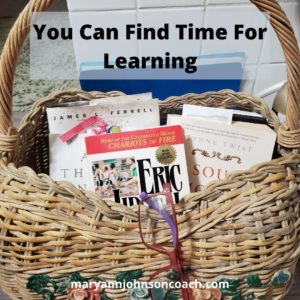 I had a mom call me in tears. She couldn’t figure out how to continue her education and still wear all the other hats that she must wear. She wanted some advice.
I had a mom call me in tears. She couldn’t figure out how to continue her education and still wear all the other hats that she must wear. She wanted some advice.
 The trip was a mixed bag, if I am honest. The kids and I had some great times, and I kept Gus worn out. : ) He had one nap and wanted another Saturday, but we were busy. This from a boy who has all but given up naps.
The trip was a mixed bag, if I am honest. The kids and I had some great times, and I kept Gus worn out. : ) He had one nap and wanted another Saturday, but we were busy. This from a boy who has all but given up naps.
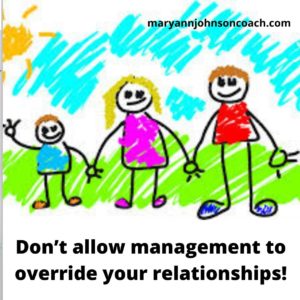 I have been thinking back to 2015. In February of that year, I had a friend who turned 111. You read that right, 111! She lived with her daughter, who was 87. Anna was in good health and could get around with her walker; she bathed herself, fed herself, and was as sharp as a tack. Anna is gone now, but caring for my mom, who is turning 91 in March, made me think back to some important things I learned about management vs. relationship from Anna and her daughter.
I have been thinking back to 2015. In February of that year, I had a friend who turned 111. You read that right, 111! She lived with her daughter, who was 87. Anna was in good health and could get around with her walker; she bathed herself, fed herself, and was as sharp as a tack. Anna is gone now, but caring for my mom, who is turning 91 in March, made me think back to some important things I learned about management vs. relationship from Anna and her daughter.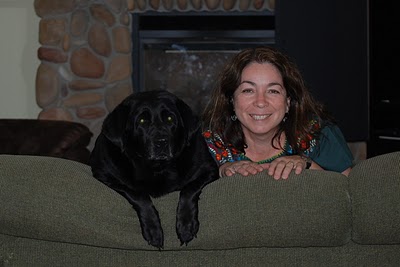
 I knew a BIG black dog named Majestic. He belonged to my friend Cathy. I am sure that in his prime, he was majestic. But when I knew him, he was far along in age and had begun to slow down…a lot! His hips hurt, and his eyesight had gone.
I knew a BIG black dog named Majestic. He belonged to my friend Cathy. I am sure that in his prime, he was majestic. But when I knew him, he was far along in age and had begun to slow down…a lot! His hips hurt, and his eyesight had gone.
 I want to share a remarkable experience and a dear friend with you. I got an email from Livia Pewtress asking me to take a test online to see my mindset quotient. I don’t do much of this type of thing anymore, as full-time caregiving doesn’t leave much space in my life. So, I almost hit delete but had a feeling I should take the test.
I want to share a remarkable experience and a dear friend with you. I got an email from Livia Pewtress asking me to take a test online to see my mindset quotient. I don’t do much of this type of thing anymore, as full-time caregiving doesn’t leave much space in my life. So, I almost hit delete but had a feeling I should take the test.
 Wise people seek wise counsel.
Wise people seek wise counsel.
 I have a friend, Ann, who has taught children with special needs for 16 years. I have been in her classroom, and she is terrific. But this year, she retired, and her kids miss her.
I have a friend, Ann, who has taught children with special needs for 16 years. I have been in her classroom, and she is terrific. But this year, she retired, and her kids miss her.
 I went to the grocery store very early in the morning. The day was cold, 18 degrees, so I put on gloves. In the store, I realized I couldn’t open the produce bags with gloves on and stuffed them in my pocket.
I went to the grocery store very early in the morning. The day was cold, 18 degrees, so I put on gloves. In the store, I realized I couldn’t open the produce bags with gloves on and stuffed them in my pocket.